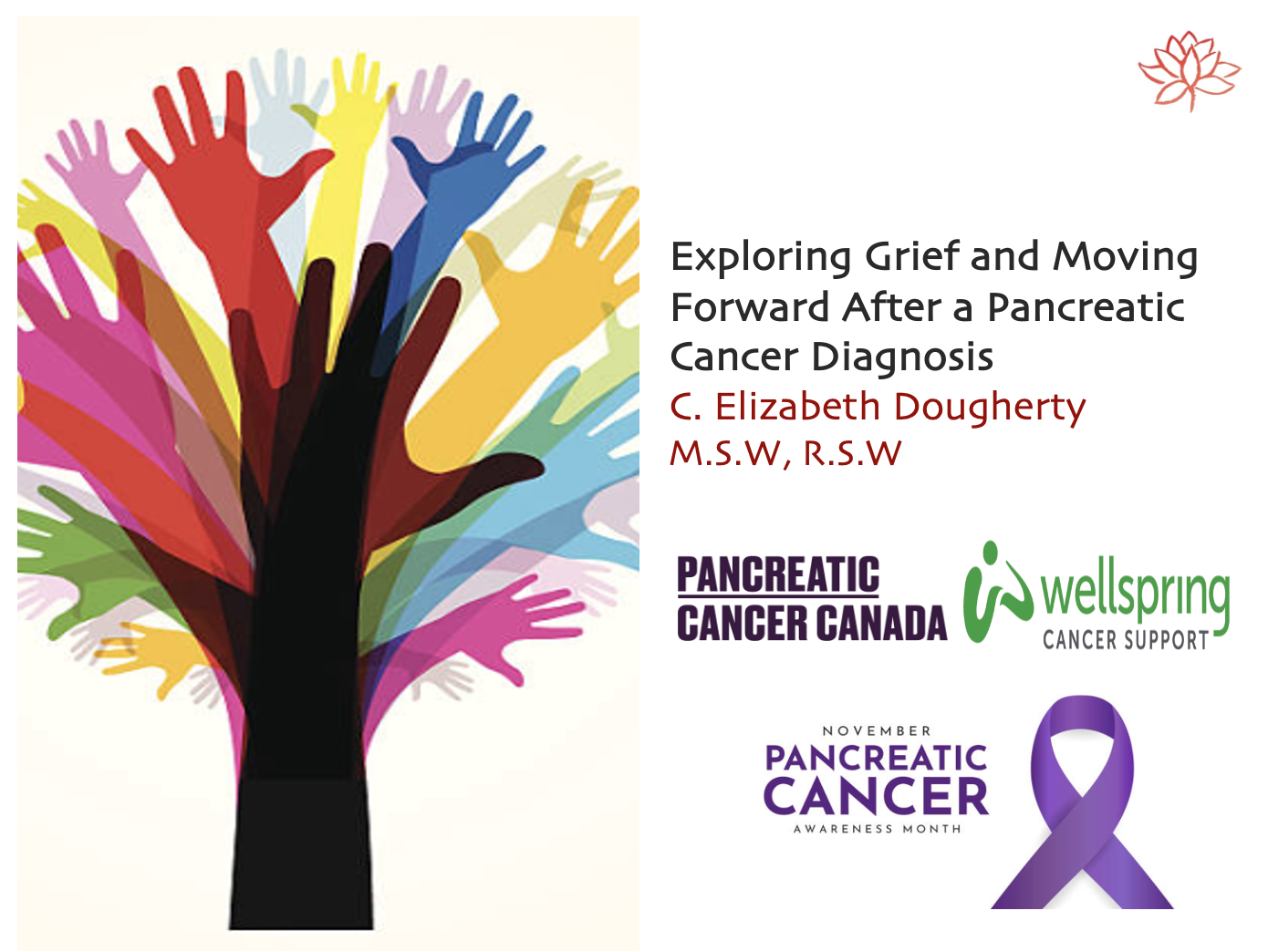I am honoured to deliver the national webinar, “Exploring Grief and Moving Forward After a Pancreatic Cancer Diagnosis” for Wellspring as they partner with Pancreatic Cancer Canada in support of Pancreatic Cancer Awareness Month.
Pancreatic Cancer is often found in later stages because it has relatively few symptoms and is statistically one of the worst cancers for treatment and survival. Anticipatory grief is one of the many unique challenges encountered following a Pancreatic Cancer diagnosis as 70% of people diagnosed with pancreatic cancer do not survive past the first year, which means a Pancreatic Cancer diagnosis can be traumatic for patients and families.
In this webinar we will define Anticipatory Grief and explore some universal sources of grief, while demystifying and acknowledging different types of loss, and consider how we uniquely metabolize grief. Lastly, we will highlight some resources for support and explore considerations for self-care.
Searching for Meaning and Finding a “New Normal”
Grateful to The Leukemia & Lymphoma Society of Canada for the opportunity to co-present Searching for Meaning and Finding a “New Normal” with author and advocate Aviva Rubin.
This free webcast briefly explored the impact of a cancer diagnosis - both on the individual and family. Additionally, the non-medical implications following a diagnosis were addressed and further highlighted some of the challenges in moving forward and finding a "new normal."
This free webcast is now archived for viewing. For information or to view, please visit The Leukemia & Lymphoma Society of Canada
#BustingTheMyths about Hospice Palliative Care
It’s Hospice Palliative Care Week in Canada.
The campaign (May 5th – 11th) this year focuses on #BustingTheMyths about Hospice Palliative Care
This year, the Canadian Hospice Palliative Care Association (CHPCA) designed a “Busting the Myths” campaign as a response to the need to educate Canadians including caregivers, physicians and all healthcare providers, citizens and political leaders around common myths about hospice palliative care.
The #BustingTheMyths campaign aims to empower Canadians through education by identifying and clarifying misperceptions about Hospice Palliative Care in Canada.
Working together to educate one another is a vital step in the pursuit of excellent Hospice PalliativeCare.
Source: CHPCA Canadian Hospice Palliative Care Association
Fraying at the Edges. A Life-changing diagnosis. #Alzheimer's @nytimes
“The Taylors hated the stealth that encased the disease, how it was treated like an unmentionable cousin. They wanted no part of that. Ms. Taylor decided that she would not show herself as some spackled-over person. “It was my decision to let the disease be alive in my life,” she said. “You don’t have to just throw in the towel.”
She didn’t know the order of whom she would tell, nor how to phrase something so shackled with frightful connotations. Your life becomes a script. Alzheimer’s, she knew, leaves its heavy imprint on everyone…
Just recently, Ms. Taylor had discovered the website To Whom I May Concern, the creation of Maureen Matthews, a psychiatric nurse. It arranges for people in the early stage of dementia to act out plays telling what it is like for them. Ms. Taylor clicked on some videos, at once felt the common spirit. The person saying, ‘People take that diagnosis and assume that you are now officially irrelevant.’ And: ‘It’s not that we want people to treat us as if we have Alzheimer’s. But at the same time we want people to recognize that we have it. Confusing, right? Welcome to our world.’ And: ‘The end stage is our future. But not today’.”





